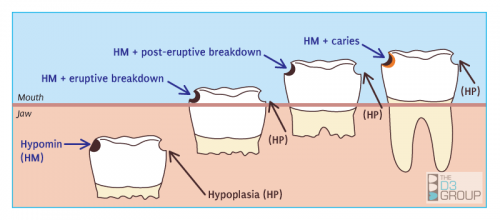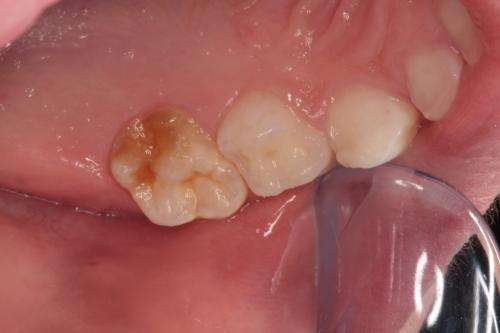Chalky teeth: A silent epidemic damaging 1 in 6 children's teeth

Melbourne researchers call on parents, dentists and other health professionals to act to save children's teeth.
A recent study has shown that at least one in six children is affected by 'chalky teeth', placing them at a heightened risk of tooth decay. Many of the affected children are losing their adult molars and are on a path to years of expensive dentistry and orthodontics.
There's currently no cure, but with early detection and dental treatment, tooth decay or tooth extraction can often be avoided. However, many cases aren't getting to the dentist quick enough.
"Parents think they've done everything right for their child's teeth – good hygiene, fluoride and diet. Then they take them to the dentist and amongst a mouthful of healthy teeth are a few bad ones. They want to know what's gone wrong." says David Manton, Professor of Paediatric Dentistry at the University of Melbourne.
The answer is that some of the teeth were damaged while they were still developing inside the jaw, most likely by a childhood illness.
"The commonest sign is creamy-brown or extra-white spots on your child's teeth. You may see them on their baby teeth, and that could be a sign of trouble later when the adult molars come through, which are the teeth most at risk."

"Ideally, children should have regular dental check-ups from the time their baby teeth first erupt into the mouth and particularly when the child's adult teeth appear around the age of six", says Professor Manton.
"Parents and health professionals seeing children now need to be aware of the condition," says Sharon Goldfeld, a paediatrician and chair of the child and adolescent oral health working group of the Royal Australasian College of Physicians.
"If you or your doctor think that your child may have chalky teeth, check with your dentist promptly", she says.
A website has been set up to tell parents, children and health professionals more about chalky teeth and how to recognise them. This world-first education resource is at www.thed3group.org and was launched today in Melbourne.
The website is part of a national research and awareness program organised by The D3 Group – an interdisciplinary research network focused on developmental dental defects.

Chalky teeth's formal name is molar hypomineralisation. "The condition results in teeth that have abnormally low amounts of calcium mineral," says Mike Hubbard, Professor of Oral and Facial Science. "So even in mildly affected teeth you can see some extra-white patches – that's a key sign."
Chalky teeth is not related to a child's diet, dental hygiene or lifestyle. "In first world countries around 10 per cent of the total health budget goes on treating dental caries," says Professor Manton. "With greater awareness of chalky teeth symptoms by parents and healthcare professionals, and timely visits to the dentist, a lot of that money could be saved and used elsewhere."
The research network is now working to understand the underlying links between chalky teeth and childhood illnesses, with the hope of preventing the development of the condition.
More information: Chalky teeth background information page



















